The AnandTech Coffee Lake Review: Initial Numbers on the Core i7-8700K and Core i5-8400
by Ian Cutress on October 5, 2017 9:00 AM EST- Posted in
- CPUs
- Intel
- Core i5
- Core i7
- Core i3
- 14nm
- Coffee Lake
- 14++
- Hex-Core
- Hyperthreading
Benchmarking Performance: CPU Encoding Tests
One of the interesting elements on modern processors is encoding performance. This includes encryption/decryption, as well as video transcoding from one video format to another. In the encrypt/decrypt scenario, this remains pertinent to on-the-fly encryption of sensitive data - a process by which more modern devices are leaning to for software security. Video transcoding as a tool to adjust the quality, file size and resolution of a video file has boomed in recent years, such as providing the optimum video for devices before consumption, or for game streamers who are wanting to upload the output from their video camera in real-time. As we move into live 3D video, this task will only get more strenuous, and it turns out that the performance of certain algorithms is a function of the input/output of the content.
All of our benchmark results can also be found in our benchmark engine, Bench.
7-Zip 9.2: link
One of the freeware compression tools that offers good scaling performance between processors is 7-Zip. It runs under an open-source licence, is fast, and easy to use tool for power users. We run the benchmark mode via the command line for four loops and take the output score.
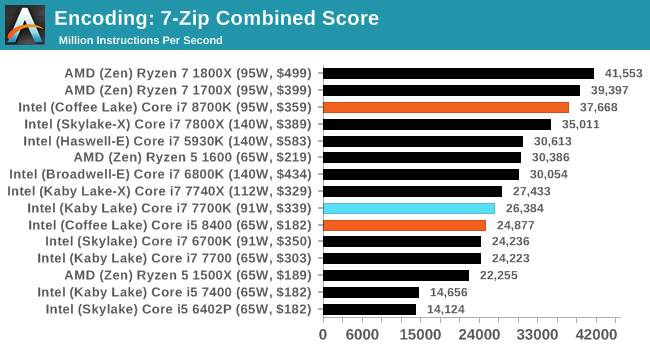
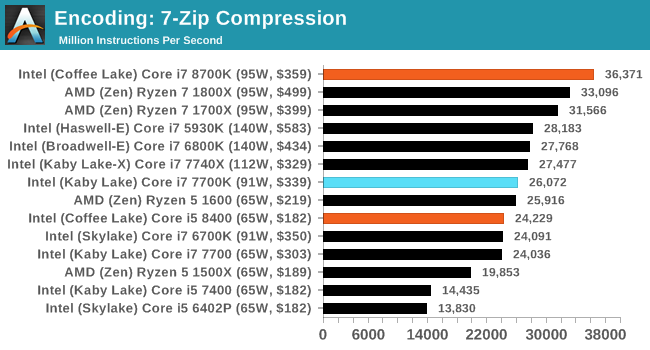
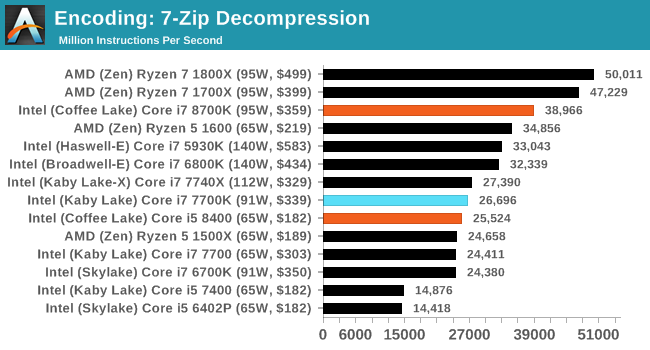
WinRAR 5.40: link
For the 2017 test suite, we move to the latest version of WinRAR in our compression test. WinRAR in some quarters is more user friendly that 7-Zip, hence its inclusion. Rather than use a benchmark mode as we did with 7-Zip, here we take a set of files representative of a generic stack (33 video files in 1.37 GB, 2834 smaller website files in 370 folders in 150 MB) of compressible and incompressible formats. The results shown are the time taken to encode the file. Due to DRAM caching, we run the test 10 times and take the average of the last five runs when the benchmark is in a steady state.
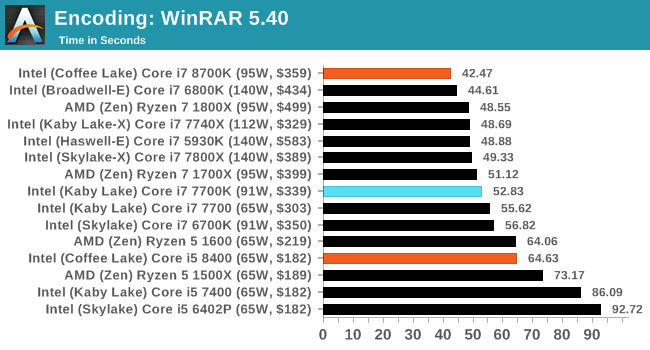
AES Encoding
Algorithms using AES coding have spread far and wide as a ubiquitous tool for encryption. Again, this is another CPU limited test, and modern CPUs have special AES pathways to accelerate their performance. We often see scaling in both frequency and cores with this benchmark. We use the latest version of TrueCrypt and run its benchmark mode over 1GB of in-DRAM data. Results shown are the GB/s average of encryption and decryption.
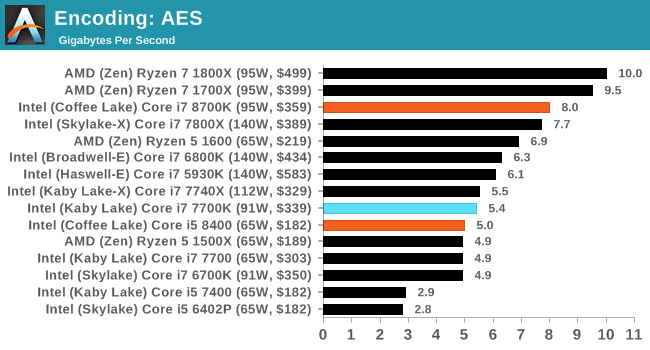
HandBrake v1.0.2 H264 and HEVC: link
As mentioned above, video transcoding (both encode and decode) is a hot topic in performance metrics as more and more content is being created. First consideration is the standard in which the video is encoded, which can be lossless or lossy, trade performance for file-size, trade quality for file-size, or all of the above can increase encoding rates to help accelerate decoding rates. Alongside Google's favorite codec, VP9, there are two others that are taking hold: H264, the older codec, is practically everywhere and is designed to be optimized for 1080p video, and HEVC (or H265) that is aimed to provide the same quality as H264 but at a lower file-size (or better quality for the same size). HEVC is important as 4K is streamed over the air, meaning less bits need to be transferred for the same quality content.
Handbrake is a favored tool for transcoding, and so our test regime takes care of three areas.
Low Quality/Resolution H264: Here we transcode a 640x266 H264 rip of a 2 hour film, and change the encoding from Main profile to High profile, using the very-fast preset.
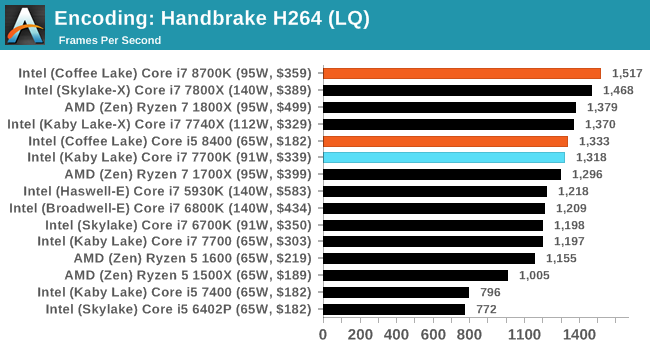
High Quality/Resolution H264: A similar test, but this time we take a ten-minute double 4K (3840x4320) file running at 60 Hz and transcode from Main to High, using the very-fast preset.
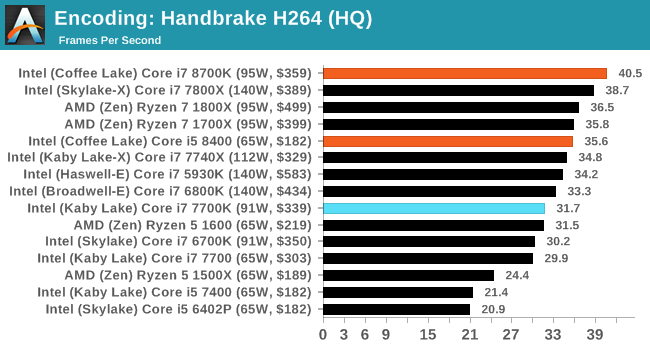
HEVC Test: Using the same video in HQ, we change the resolution and codec of the original video from 4K60 in H264 into 4K60 HEVC.
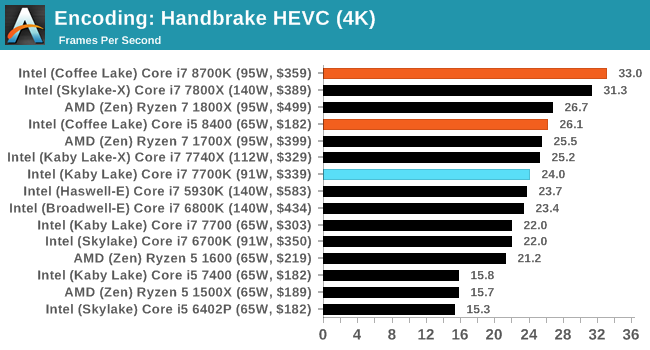










222 Comments
View All Comments
xchaotic - Monday, October 9, 2017 - link
Well yeah, but even with non-HT i5 and i3, you still have plenty of cores to work with.Even if the OS (or a background task - say Windows Defender?) takes up a thread, you still have other cores for your game engine.nierd - Monday, October 9, 2017 - link
Do we? I've yet to see a good benchmark that measures task switching and multiple workloads - they measure 'program a' that is bad at using cores - and 'program b' that is good at using cores.In today's reality - few people are going to need maximum single program performance. Outside of very specific types of workloads (render farming or complex simulations for science) please show me the person that is just focused on a single program. I want to see side by side how these chips square off when you have multiple completing workloads that force the scheduler to balance tasks and do multiple context shifting etc. We used to see benchmarks back in the day (single core days) where they'd do things like run a program designed to completely trash the predictive cache so we'd see 'worst case' performance, and things that would stress a cpu. Now we run a benchmark suite that shows you how fast handbrake runs *if it's the only thing you run*.
mapesdhs - Tuesday, October 10, 2017 - link
I wonder if there's pressure never to test systems in that kind of real-world manner, perhaps the results would not be pretty. Not so much a damnation of the CPU, rather a reflection of the OS. :D Windows has never been that good at this sort of thing.boeush - Monday, October 9, 2017 - link
An *intelligent* OS thread scheduler would group low-demand/low-priority threads together, to multitask on one or two cores, while placing high-priority and high-CPU-utilization threads on respective dedicated cores. This would maximize performance and avoid trashing the cache, where and when it actually matters.If Windows 10 makes consistent single-thread performance hard to obtain, then the testing is revealing a fundamental problem (really, a BUG) with the OS' scheduler - not a flaw in benchmarking methodology...
samer1970 - Monday, October 9, 2017 - link
I fail to understand how you guys review a CPU meant for overclocking and only put non OC results in your tables ?If I wanted the i7 8700K without overclocking I would pick up the i7 8700 ans save $200 for both cooling and cheaper motherboard. and the i7 8700 can turbo all 6 cores to 4.3Ghz just like the i7 8700K
someonesomewherelse - Saturday, October 14, 2017 - link
Classic Intel, can't they make a chipset/socket with extra power pins so it would last for at least a few cpu generations?Gastec - Saturday, October 14, 2017 - link
I'm getting lost in all these CPU releases this year, it feels like there is a new CPU coming out every 2 months. Don't get me wrong, I like to have many choices but this is pathetic really. Someone is really desperate for more money.zodiacfml - Sunday, October 15, 2017 - link
The i3!lordken - Saturday, October 28, 2017 - link
cant you make bars for amd cpus red in graphs? Its crap to search for them if all lines are black (at least 7700k was highlighted in some)a bit disappointed, not a single world of ryzen/amd on summary page, you compare only to intel cpus? how come?
why only 1400 in civ AI test and not any R7/5 CPUs?
Also I would expect you hammer down intel a bit more on that not-so-same socket crap.
Ritska - Friday, November 3, 2017 - link
Why is 6800k faster then 7700k and 8700k in gaming? Is it worth buying if I can get one for 300$?